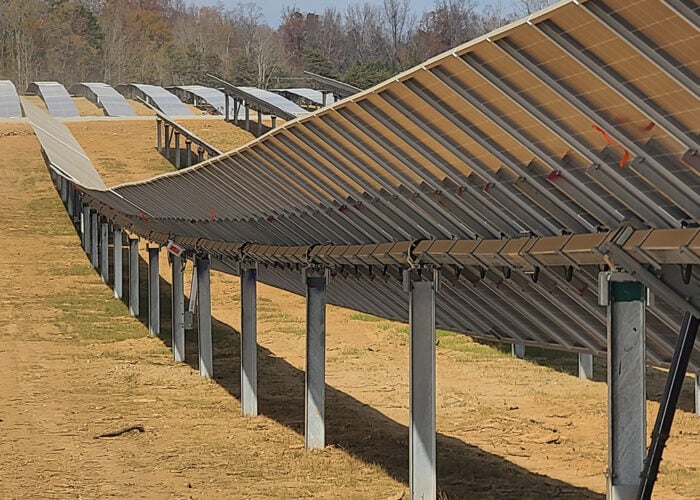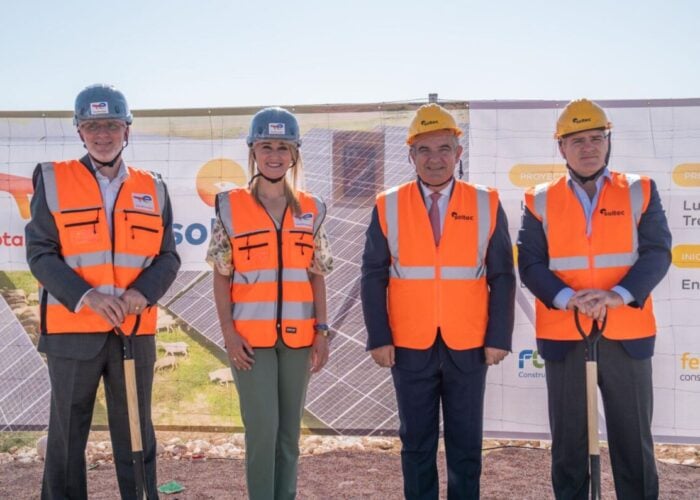After the warning note sounded last night at the launch of Solar Power International 2015 over the impact of the pending investment tax credit drop-off, the first full day of the show saw this theme take centre stage.
Some informative insights into how the industry is readying itself were on offer during a CEO panel, in which, inevitably, the ITC was one of the big issues for discussion. The debate, under the title ‘Surviving in a highly competitive environment’, brought together the CEOs from downstream specialist Conergy, residential and commercial installer, REC Solar, and developer Soltage.
Unlock unlimited access for 12 whole months of distinctive global analysis
Photovoltaics International is now included.
- Regular insight and analysis of the industry’s biggest developments
- In-depth interviews with the industry’s leading figures
- Unlimited digital access to the PV Tech Power journal catalogue
- Unlimited digital access to the Photovoltaics International journal catalogue
- Access to more than 1,000 technical papers
- Discounts on Solar Media’s portfolio of events, in-person and virtual
Session chair Jenny Chase of Bloomberg New Energy Finance asked the panellists how they were preparing for the pending changes to the ITC, which is due to be stepped down from 30% to 10% for commercial solar and to zero for residential from January 2017.
Andrew de Pass, chief executive of specialist downstream player, Conergy, which is active in a number of international markets, said his company had learned the hard way about the speed with which markets can go from boom to bust, lessons he said companies in the US should take heed of.
He cited the UK, where Conergy has thrived in recent years, but which has in the space of just a few weeks gone from being Europe’s fastest growing market to one that looks to be uncertain to say the least.
“All of us should have eyes wide open with regards to what could happen,” de Pass said.
“In Europe last year, and globally, the largest market [for us] was the UK, where we developed and constructed over 250MW. We knew that was going to be tailored down with regards to the ROC and feed-in tariff and our expectation was to reorient towards rooftop, which is what we have to do globally in most developed markets. And then two weeks ago the government just pulled away all the subsidy for rooftop, so basically just killed the solar market in the UK. So I would keep your eyes open with regard to the US.”
De Pass said a resolution to the ITC was unlikely until after the 2016 presidential election, because the political environment was “just too volatile and toxic”.
“So post-November 2016, the question will be who’s in congress and can they broker a deal. But assume they don’t and we have the ITC cliff, it’s going to be good – basically we will have to put 20 or 30% more equity into projects, we’re going to push our suppliers, push our subcontractors, returns are going to go down, developer margins are going to go down, it’s not going to be pretty. So as of today I would urge people to talk to their senators and congressmen, pressure needs to be put on them; we also need our lobby groups to be very focused and perform.”
Al Bucknam, CEO of REC Solar, agreed a “rescue” of the ITC was not something to be counted on, although some kind of “soft landing” was something the industry would like to see.
“It’s unrealistic to expect an outright extension at 30%, but if it declined 1.25% per quarter for a period of time, or whatever they could come up with, it would allow it to less of a shock and allow some orderly market reaction. If we leave it like it is we’re going to be jamming everything into the front half of 2016, we’re going to be doing nights and weekends, we’re going to be compromising quality and safety because all the industry is going to be trying to beat the deadline. And that’s not the way to run a market,” Bucknam said.
But should that desired scenario fail to transpire, Bucknam said, “we’re prepared”.
“We prepare by working our costs for procurement through to our construction costs on site, working with our subs. We try to build flexibility into our workforce. So we’re expecting a certain baseload of work, so we have a team that’s dedicated to that. But we’re also having all our teams, engineering, construction, finance, HR, to try to bring on more flexible resource…so we can adjust to changes. Because frankly no one knows exactly how this is going to play out, so flexibility is going to be extremely important.”
Jesse Grossman, CEO of Soltage, echoed the need for flexibility, adding that the industry needed to approach the ITC cliff “with a degree of belt-tightening”, something he said the “whole industry is prepared to do”.
But Grossman also downplayed the eventual impact of the ITC drop-off, highlighting the fact that the investment community as much as the solar industry did not want to see a hitherto profitable sector fall away.
“In an environment where there’s a 10% ITC, certainly there’s still tax equity available and the tax equity sources are prepared to provide tax equity on some of the same terms or even on enhanced terms. And a lot of those tax equity sources are also looking at participating in other parts of the capital stack so that they can continue to put through the same amount of volume they’ve been doing on an annual basis and keep their teams intact; you can imagine that a team that’s been doing a billion dollars of transactions a year, they’re not immediately going to want to go down to US$300 million of transactions a year – that’s a lot of jobs lost.
“So I think we’ll see a lot of innovation on the capital side to be more flexible in how capital is put into the market to keep the aggregate numbers high and growing. Certainly there will be come marginal states that will fall off, especially those states with a lower reference electricity prices. What I think this will do from an innovation perspective, and we’re seeing a lot of this in business plans today, is really figuring out ways of continuing to sell kilowatt hours at the retail environment.”
Grossman said his company had been modelling 2017 and beyond for some time and “we’re not particularly concerned”.
“We think it would be great if there’s an extension, I share my panellists’ view it’s unlikely. But I do think the solar industry will continue to grow and thrive from January 1st.”
Under the microphone, de Pass was heard to say this analysis was “overly optimistic”.







